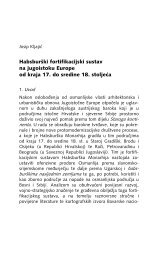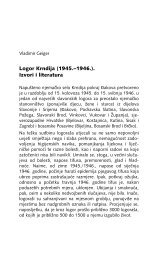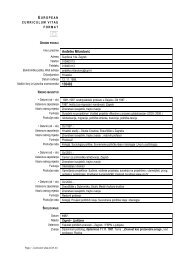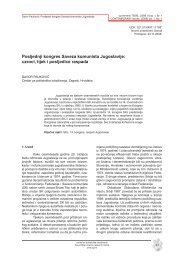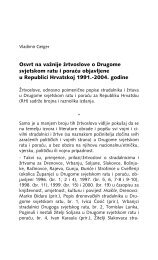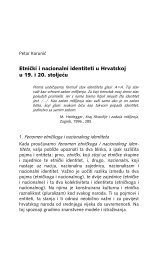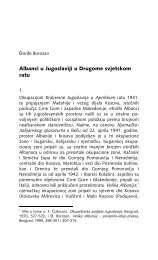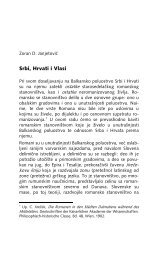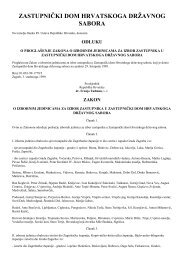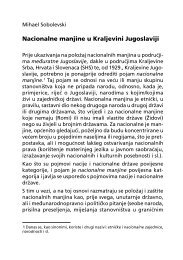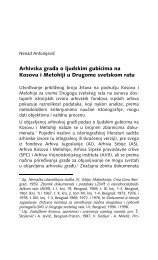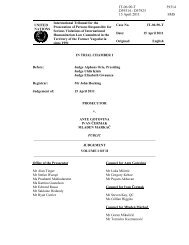ISSN 1847-2397 godište II broj 1 2009. | volume II number 1 2009
ISSN 1847-2397 godište II broj 1 2009. | volume II number 1 2009
ISSN 1847-2397 godište II broj 1 2009. | volume II number 1 2009
- No tags were found...
You also want an ePaper? Increase the reach of your titles
YUMPU automatically turns print PDFs into web optimized ePapers that Google loves.
Sabina Stan: The Discourse on the “Crisis of the Health Care System”suvremene TEME, (<strong><strong>2009</strong>.</strong>) God. 2, Br. 1CONTEMPORARY issues, (<strong>2009</strong>) Vol. 2, No. 1(Starn, 1971: 13). But, while the notion of crisisis all pervasive and is used to advance diversepolitical agendas, it has nevertheless been mobilisedwith more success by the right. Indeed,as it was applied with a vengeance in analysesof post oil crisis developments in Western societies,the notion was turned into a major componentof neo-liberal bashing of the welfare state.In this discursive process, the disciplineof management played an important role. Thus,on the one hand, in the struggle over the legitimatedefinition of and scholarship on the notionof crisis, management succeeded in gaining holdon the notion by transforming it into another of itsdomains of expertise. 44 On the other hand, thelate 20 th century also witnessed the introductionof management theories in public administration.The resulting “new public management” broughtinto conjunction both systemic and crisis visionsof public services. This conjunction transformedolder strains of meaning of the notion of crisis.Indeed, older dramaturgical, historical and medicalmeanings construct the crisis as a key buttemporary moment in a developmental cycle(Holton, 1987: 504, Masur, 1975, Starn, 1971).By contrast, in the health care crisis discourseanalysed above, the crisis is seen as a permanentstate and an inherent condition of the system.In a wider perspective, the discourse onthe crisis of the health care system developed inQuebec can be seen as contributing to the widerdiscourse on the crisis of public health care systems,which is itself part of the even wider discourseon the crisis of the welfare state. As withthe latter, the discourse on the crisis of the healthcare system is a global one. Indeed, the last decadewitnessed the development of a transnationalneo-liberal “reforming common sense” inrespect to health care (Serré and Pierru, 2001).Produced by international financial and healthorganisations, this new consensus is based essentiallyon an economic and managerial visionthat obscures and disqualifies political approachesto health issues. Through the production of44 This was specifically done through the "crisismanagement" branch. See, for example, the special <strong>number</strong>of the Journal of Business Administration edited by Smartand Stanbury in 1978, under, significantly for the merger betweenmanagement and public policy, the Institute for Researchon Public Policy. The special <strong>number</strong> was titled Studiesin Crisis Management. Ever since the beginning of the90s, a journal was, specifically dedicated to the topic underthe title Journal of Contingencies and Crisis Management. Itis interesting to note that management studies’ take-over ofcrisis scholarship and expertise continues the 20 th centurypredominance of classical economy in the handling of thenotion of crisis (Masur, 1978: 590).international data, statistics, classifications andcomparisons, these organizations dramatisethe dysfunctions of existent public health caresystems by diagnosing them with an “efficiencycrisis” having its cause in their bureaucratic organization45 (Serré and Pierru, 2001).This global discourse on crisis provided,to a wide range of actors, a ready repertoire fortalking about problems in the health care sector.Evans noticed, for example, that the decline inhospital use, that followed, in Quebec, the Rochonreforms, has lead to increasing claims, particularlyfrom hospital workers, that “the systemis falling apart”. For him, the declining positionof hospital workers drove them, once “the strongestsupporters of Medicare, 46 into an inadvertentalliance with its traditional enemies” (Evans,2000: 894). These enemies are “powerful interestgroups” that include providers of care (physicians,private insurers and corporate providers),higher-income Canadians, as well as “ideologicalentrepreneurs” that “champion the interestsof the wealthy, cheerleading for the private marketplace”(Evans, 2000: 894-896; also, Evans,2008). Additionally, according to Hutchinsonand his colleagues, crisis statements can alsobe fostered by less ferocious foes of the publicsystem. For example, policy makers keen on effectingchange in the atomised primary care sectoroften have recourse to propositions for radicalchange. For them, crisis statements serve tosecure public and political support to “big bang”approaches (Hutchinson et al., 2001).These diverse statements, claims, andinterests have collided with media campaignsthat have made the Canadian health care crisistheir battle horse. Some analysts saw thus thecrisis discourse as mounted in explicit “disinformationcampaigns” of a “policy warfare” originatingin the neighbouring United States (Evans,2000: 894, 895, Marmor, 1999). The campaignsdeveloped at the beginning of the nineties “as a45 The more so, as some analysts point out, whenmedia's search for sensational revelations weigh the balancetowards the darkest scenario. Thus, for example, whenCanadian media made their selective reading of the 2000WHO report, and chose to downplay a still respectable 7 thplace ranking in terms of goal attainment occupied by theCanadian health care system, for its 30 th rating in terms ofachievement relative to potential. For some analysts, thischoice has contributed to further "promoting an air of crisis"(Lewis et al., 2001: 926).46 In English Canada, “Medicare” is used in referenceto what Quebec terms as “le régime d’assurancemaladie” and sometimes as a synonym for “the health caresystem”. It would be interesting to analyse, in a comparativeperspective, the English media use of “the system” in its discourseon the health care sector.centar za politološka istraživanjathe political science research centrewww.cpi.hr27



